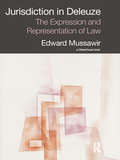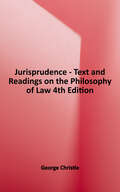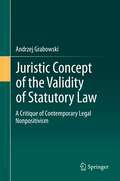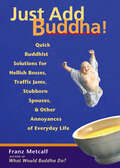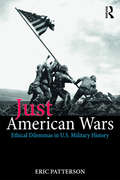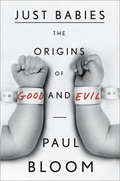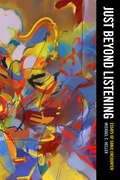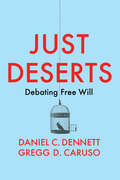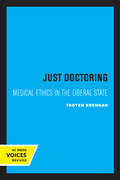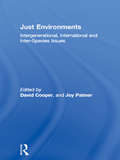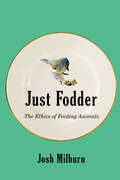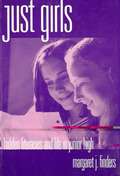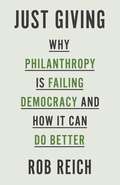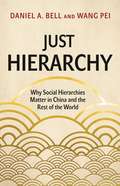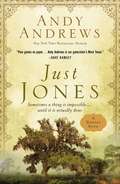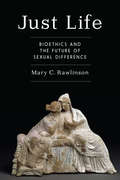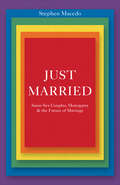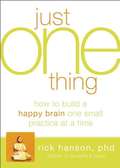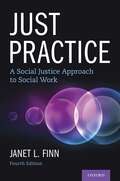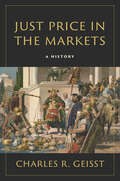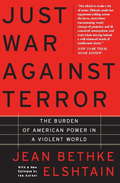- Table View
- List View
Jurisdiction in Deleuze: The Expression And Representation Of Law
by Edward MussawirJurisdiction in Deleuze: The Expression and Representation of Law explores an affinity between the philosophy of Gilles Deleuze and jurisprudence as a tradition of technical legal thought. The author addresses and reopens a central aesthetic problem in jurisprudence: the difference between the expression and the representation of law. Deleuze is taken as offering not just an important methodological recovery of an ‘expressionism’ in philosophy – specifically through Nietzsche and Spinoza – but also a surprisingly practical jurisprudence which recasts the major technical terms of jurisdiction (persons, things and actions) in terms of their distinctively expressive or performative modalities. In paying attention to law’s expression, Deleuze is thus shown to offer an account of how meaning may attach to the instrument and medium of law and how legal desire may be registered within the texture and technology of jurisdiction. Contributing both to a renewed transposition of Deleuze into contemporary legal theory, as well as to an emerging interest in law’s technology, institution and instrumentality in critical legal studies, Jurisdiction in Deleuze will be of considerable interest.
Jurisprudence, Text and Readings on the Philosophy of Law (American Casebook Series)
by George G. ChristieThis book is designed for use in courses in law schools and university departments of philosophy. It can serve as a text for basic and advanced courses and seminars. Readings include excerpts of classic works of Aristotle, Aquinas, Locke, Hobbes, Kant, Bentham, and Austin. Also included are excerpts from standard works of twentieth-century philosophers. The book explores current legal discourse with readings on topics such as sociobiology, Islamic law, the legal process school, legal feminism, critical legal studies, intersectionality and gender identity theories, law and economics, and new private law theories. It reprints leading cases on natural rights/human rights and readings from online blogs, op-ed essays, news stories and internet publications, as well as drawing on literary treatment of topics relevant to legal philosophy.
Juristic Concept of the Validity of Statutory Law: A Critique of Contemporary Legal Nonpositivism
by Malgorzata Kieltyka Andrzej GrabowskiThis book presents the theory of the validity of legal norms, aimed at the practice of law, in particular the jurisdiction of the constitutional courts. The postpositivist concept of the validity of statutory law, grounded on a critical analysis of the basic theories of legal validity elaborated up to now, is introduced. In the first part of the book a contemporary German nonpositivist conception of law developed by Ralf Dreier and Robert Alexy is analysed in order to answer the question whether the juristic concept of legal validity should include moral standards or criteria. In the second part, a postpositivist concept of legal validity and an innovative model of validity discourse, based on the juristic presumption of the validity of legal norms, are proposed. The book is a work on analytical legal theory, written from a postpositivist, detached point of view.
Jus Post Bellum and Transitional Justice
by Larry May Elizabeth EdenbergThis collection of essays brings together jus post bellum and transitional justice theorists to explore the legal and moral questions that arise at the end of war and in the transition to less oppressive regimes. Transitional justice and jus post bellum share in common many concepts that will be explored in this volume. In both transitional justice and jus post bellum, retribution is crucial. In some contexts criminal trials will need to be held, and in others truth commissions and other hybrid trials will be considered more appropriate means for securing some form of retribution. But there is a difference between how jus post bellum is conceptualized, where the key is securing peace, and transitional justice, where the key is often greater democratization. This collection of essays highlights both the overlap and the differences between these emerging bodies of scholarship and incipient law.
Just Add Buddha!: Quick Buddhist Solutions for Hellish Bosses, Traffic Jams, Stubborn Spouses, and Other Annoyances of Everyday Life
by Franz Metcalf“A diverse and edifying collection of practices to use in annoying and difficult circumstances” from the author of What Would Buddha Do? (Spirituality & Practice).Written for spiritual seekers who deal with unenlightened coworkers and inconsiderate bank tellers more often than Zen masters and Tibetan monks, this book demonstrates the practical side of Buddhism. Author Franz Metcalf shows how to weave simple vows, quick rethinks, instant relaxations, fast visualizations, and many other stripped-down Buddhist practices into every area of life. Individually, Metcalf’s techniques work as quick fixes for specific dilemmas, but woven together, they gradually strengthen one’s spiritual base when one day a habitual way of being has been quietly transformed. While not written to impress pure Buddhists, this book takes Buddhism seriously. Approachable sections on Buddhism’s rich tradition and a sprinkling of quotes from ancient scripture and contemporary teachers connect the book’s practices to the deeper wisdom underlying them. Always, Just Add Buddha! remains squarely focused on daily life, drawing out the most practical aspects of Buddhism.
Just American Wars: Ethical Dilemmas in U.S. Military History (War, Conflict and Ethics)
by Eric PattersonThis book examines the moral choices faced by U.S. political and military leaders in deciding when and how to employ force, from the American Revolution to the present day. Specifically, the book looks at discrete ethical dilemmas in various American conflicts from a just war perspective. For example, was the casus belli of the American Revolution just, and more specifically, was the Continental Congress a "legitimate" political authority? Was it just for Truman to drop the atomic bomb on Japan? How much of a role did the egos of Kennedy, Johnson and Nixon play in prolonging the Vietnam War? Often there are trade-offs that civilian and military leaders must take into account, such as General Scott’s 1847 decision to bombard the city of Veracruz in order to quickly move his troops off the malarial Mexican coast. The book also considers the moral significance and policy practicalities of different motives and courses of action. The case studies provided highlight the nuances and even limits of just war principles, such as just cause, right intention, legitimate authority, last resort, likelihood of success, discrimination, and proportionality, and principles for ending war such as order, justice, and conciliation. This book will be of interest for students of just war theory, ethics, philosophy, American history and military history more generally.
Just Babies: The Origins of Good and Evil
by Paul Bloom<P>A leading cognitive scientist argues that a deep sense of good and evil is bred in the bone. From John Locke to Sigmund Freud, philosophers and psychologists have long believed that we begin life as blank moral slates. Many of us take for granted that babies are born selfish and that it is the role of society--and especially parents--to transform them from little sociopaths into civilized beings. <P>In Just Babies, Paul Bloom argues that humans are in fact hardwired with a sense of morality. Drawing on groundbreaking research at Yale, Bloom demonstrates that, even before they can speak or walk, babies judge the goodness and badness of others' actions; feel empathy and compassion; act to soothe those in distress; and have a rudimentary sense of justice. <P>Still, this innate morality is limited, sometimes tragically. We are naturally hostile to strangers, prone to parochialism and bigotry. Bringing together insights from psychology, behavioral economics, evolutionary biology, and philosophy, Bloom explores how we have come to surpass these limitations. <P> Along the way, he examines the morality of chimpanzees, violent psychopaths, religious extremists, and Ivy League professors, and explores our often puzzling moral feelings about sex, politics, religion, and race. In his analysis of the morality of children and adults, Bloom rejects the fashionable view that our moral decisions are driven mainly by gut feelings and unconscious biases. <P>Just as reason has driven our great scientific discoveries, he argues, it is reason and deliberation that makes possible our moral discoveries, such as the wrongness of slavery. Ultimately, it is through our imagination, our compassion, and our uniquely human capacity for rational thought that we can transcend the primitive sense of morality we were born with, becoming more than just babies. <P>Paul Bloom has a gift for bringing abstract ideas to life, moving seamlessly from Darwin, Herodotus, and Adam Smith to The Princess Bride, Hannibal Lecter, and Louis C.K. Vivid, witty, and intellectually probing, Just Babies offers a radical new perspective on our moral lives. <P><b>A New York Times Bestseller</b>
Just Beyond Listening: Essays of Sonic Encounter (California Studies in Music, Sound, and Media #5)
by Michael C. HellerJust Beyond Listening asks how we might think about encounters with sound that complicate standard accounts of aurality. In a series of essays, Michael C. Heller considers how sound functions in dialogue with a range of sensory and affective modalities, including physical co-presence, textual interference, and spectral haunting. The text investigates sound that is experienced in other parts of the body, altered by cross-wirings of the senses, weaponized by the military, or mediated and changed by cultural practices and memory. Building on recent scholarship in sound studies and affect theory, Heller questions not only how sound propagates acoustically but how sonic presences temper our total experience of the world around us.
Just Deserts: Debating Free Will
by Daniel C. Dennett Gregg D. CarusoThe concept of free will is profoundly important to our self-understanding, our interpersonal relationships, and our moral and legal practices. If it turns out that no one is ever free and morally responsible, what would that mean for society, morality, meaning, and the law? Just Deserts brings together two philosophers – Daniel C. Dennett and Gregg D. Caruso – to debate their respective views on free will, moral responsibility, and legal punishment. In three extended conversations, Dennett and Caruso present their arguments for and against the existence of free will and debate their implications. Dennett argues that the kind of free will required for moral responsibility is compatible with determinism – for him, self-control is key; we are not responsible for becoming responsible, but are responsible for staying responsible, for keeping would-be puppeteers at bay. Caruso takes the opposite view, arguing that who we are and what we do is ultimately the result of factors beyond our control, and because of this we are never morally responsible for our actions in the sense that would make us truly deserving of blame and praise, punishment and reward. Just Deserts introduces the concepts central to the debate about free will and moral responsibility by way of an entertaining, rigorous, and sometimes heated philosophical dialogue between two leading thinkers.
Just Doctoring: Medical Ethics in the Liberal State
by Troyen A. BrennanThis title is part of UC Press's Voices Revived program, which commemorates University of California Press’s mission to seek out and cultivate the brightest minds and give them voice, reach, and impact. Drawing on a backlist dating to 1893, Voices Revived makes high-quality, peer-reviewed scholarship accessible once again using print-on-demand technology. This title was originally published in 1991.
Just Environments: Intergenerational, International and Inter-Species Issues
by David E. Cooper Joy A. PalmerCan we do what we want with other species? How do conflicting international interests affect global issues? What do we owe the next generation? Just Environments investigates these questions and the ethics which lie at their core.
Just Fodder: The Ethics of Feeding Animals
by Josh MilburnAnimal lovers who feed meat to other animals are faced with a paradox: perhaps fewer animals would be harmed if they stopped feeding the ones they love. Animal diets do not raise problems merely for individuals. To address environmental crises, health threats, and harm to animals, we must change our food systems and practices. And in these systems, animals, too, are eaters.Moving beyond what humans should eat and whether to count animals as food, Just Fodder answers ethical and political questions arising from thinking about animals as eaters. Josh Milburn begins with practical dilemmas about feeding the animals closest to us, our pets or animal companions. The questions grow more complicated as he considers relationships with more distance – questions about whether and how to feed garden birds, farmland animals who would eat our crops, and wild animals. Milburn evaluates the nature and circumstances of our relationships with animals to generate a novel theory of animal rights.Looking past arguments about what we can and cannot do to other beings, Just Fodder asks what we can, should, and must do for them, laying out a fuller range of our ethical obligations to other animals.
Just Girls: Hidden Literacies and Life in Junior High
by Margaret J. FindersHighlighting the social importance of friendship, family and social networks in girls' sense of themselves, she suggests that literacy plays an important role in maintaining friendship groups and in the construction of the self.
Just Giving: Why Philanthropy Is Failing Democracy and How It Can Do Better
by Rob ReichThe troubling ethics and politics of philanthropyIs philanthropy, by its very nature, a threat to today’s democracy? Though we may laud wealthy individuals who give away their money for society’s benefit, Just Giving shows how such generosity not only isn’t the unassailable good we think it to be but might also undermine democratic values and set back aspirations of justice. Big philanthropy is often an exercise of power, the conversion of private assets into public influence. And it is a form of power that is largely unaccountable, often perpetual, and lavishly tax-advantaged. The affluent—and their foundations—reap vast benefits even as they influence policy without accountability. And small philanthropy, or ordinary charitable giving, can be problematic as well. Charity, it turns out, does surprisingly little to provide for those in need and sometimes worsens inequality.These outcomes are shaped by the policies that define and structure philanthropy. When, how much, and to whom people give is influenced by laws governing everything from the creation of foundations and nonprofits to generous tax exemptions for donations of money and property. Rob Reich asks: What attitude and what policies should democracies have concerning individuals who give money away for public purposes? Philanthropy currently fails democracy in many ways, but Reich argues that it can be redeemed. Differentiating between individual philanthropy and private foundations, the aims of mass giving should be the decentralization of power in the production of public goods, such as the arts, education, and science. For foundations, the goal should be what Reich terms “discovery,” or long-time-horizon innovations that enhance democratic experimentalism. Philanthropy, when properly structured, can play a crucial role in supporting a strong liberal democracy.Just Giving investigates the ethical and political dimensions of philanthropy and considers how giving might better support democratic values and promote justice.
Just Hierarchy: Why Social Hierarchies Matter in China and the Rest of the World
by Daniel A. BellA trenchant defense of hierarchy in different spheres of our lives, from the personal to the politicalAll complex and large-scale societies are organized along certain hierarchies, but the concept of hierarchy has become almost taboo in the modern world. Just Hierarchy contends that this stigma is a mistake. In fact, as Daniel Bell and Wang Pei show, it is neither possible nor advisable to do away with social hierarchies. Drawing their arguments from Chinese thought and culture as well as other philosophies and traditions, Bell and Wang ask which forms of hierarchy are justified and how these can serve morally desirable goals. They look at ways of promoting just forms of hierarchy while minimizing the influence of unjust ones, such as those based on race, sex, or caste.Which hierarchical relations are morally justified and why? Bell and Wang argue that it depends on the nature of the social relation and context. Different hierarchical principles ought to govern different kinds of social relations: what justifies hierarchy among intimates is different from what justifies hierarchy among citizens, countries, humans and animals, and humans and intelligent machines. Morally justified hierarchies can and should govern different spheres of our social lives, though these will be very different from the unjust hierarchies that have governed us in the past.A vigorous, systematic defense of hierarchy in the modern world, Just Hierarchy examines how hierarchical social relations can have a useful purpose, not only in personal domains but also in larger political realms.
Just Hierarchy: Why Social Hierarchies Matter in China and the Rest of the World
by Daniel Bell Wang PeiA trenchant defense of hierarchy in different spheres of our lives, from the personal to the politicalAll complex and large-scale societies are organized along certain hierarchies, but the concept of hierarchy has become almost taboo in the modern world. Just Hierarchy contends that this stigma is a mistake. In fact, as Daniel Bell and Wang Pei show, it is neither possible nor advisable to do away with social hierarchies. Drawing their arguments from Chinese thought and culture as well as other philosophies and traditions, Bell and Wang ask which forms of hierarchy are justified and how these can serve morally desirable goals. They look at ways of promoting just forms of hierarchy while minimizing the influence of unjust ones, such as those based on race, sex, or caste.Which hierarchical relations are morally justified and why? Bell and Wang argue that it depends on the nature of the social relation and context. Different hierarchical principles ought to govern different kinds of social relations: what justifies hierarchy among intimates is different from what justifies hierarchy among citizens, countries, humans and animals, and humans and intelligent machines. Morally justified hierarchies can and should govern different spheres of our social lives, though these will be very different from the unjust hierarchies that have governed us in the past.A vigorous, systematic defense of hierarchy in the modern world, Just Hierarchy examines how hierarchical social relations can have a useful purpose, not only in personal domains but also in larger political realms.
Just Jones: Sometimes a Thing Is Impossible . . . Until It Is Actually Done (A Noticer Book)
by Andy AndrewsFrom New York Times bestselling author Andy Andrews comes the return of one of our favorite fictional characters: Jones, the noticer. A mysterious elderly man with white hair and endless wisdom who always appears to show up exactly when he&’s needed most.At 3:29 a.m. on May 22, a telephone rings in Orange Beach, Alabama. Breaking the sleepy silence inside the bedroom of New York Times bestselling author Andy Andrews, a hastily whispered message heralds the news that Andy has been waiting on for seven years: Jones is back in town. Apparently, however, he is also in jail. The old man is tight-lipped about the circumstances surrounding his brief incarceration. After arriving to bail him out, Andy is shocked to discover that his trusted friend has already opened an unusual business in one of the resort town&’s most high-profile shopping districts. Jones&’s Five & Dime seems to always have exactly what visitors are looking for, even as their fate steadily becomes entwined with Jones&’s. As the town moves from spring to summer, a practical joker is becoming bolder and more inventive with every prank that is pulled. Could Jones be behind some of it? Why? And what will happen if he is? What&’s the truth about that four-hundred-pound table in his Five & Dime? What compels certain people to gather around it every morning? And why does it look as if every person Jones meets has a secret they will reveal only to him? With rare insight, Andy and Jones take us on a journey that proves the importance of perspective, the power of connection, and the ability we all have to make the impossible come true.
Just Life: Bioethics and the Future of Sexual Difference
by Mary C. RawlinsonJust Life reorients ethics and politics around the generativity of mothers and daughters rather than the right to property and the sexual proprieties of the oedipal drama. Invoking two concrete universals—everyone is born of a woman and everyone needs to eat—Rawlinson rethinks labor and food as relationships that make ethical claims and sustain agency. Just Life counters the capitalization of bodies under biopower with the solidarity of sovereign bodies.
Just Married
by Stephen MacedoThe institution of marriage stands at a critical juncture. As gay marriage equality gains acceptance in law and public opinion, questions abound regarding marriage's future. Will same-sex marriage lead to more radical marriage reform? Should it? Antonin Scalia and many others on the right warn of a slippery slope from same-sex marriage toward polygamy, adult incest, and the dissolution of marriage as we know it. Equally, many academics, activists, and intellectuals on the left contend that there is no place for monogamous marriage as a special status defined by law. Just Married demonstrates that both sides are wrong: the same principles of democratic justice that demand marriage equality for same-sex couples also lend support to monogamous marriage.Stephen Macedo displays the groundlessness of arguments against same-sex marriage and defends marriage as a public institution against those who would eliminate its special status or supplant it with private arrangements. Arguing that monogamy reflects and cultivates our most basic democratic values, Macedo opposes the legal recognition of polygamy, but agrees with progressives that public policies should do more to support nontraditional caring and caregiving relationships. Throughout, Macedo explores the meaning of contemporary marriage and the reasons for its fragility and its enduring significance. His defense of reformed marriage against slippery slope alarmists on the right, and radical critics of marriage on the left, vindicates the justice and common sense of the emerging consensus. Casting new light on today's debates over the future of marriage, Just Married lays the groundwork for a stronger institution.
Just One Thing: Developing a Buddha Brain One Simple Practice at a Time
by Rick Hanson[from the back cover] "big changes start with just one thing." You've heard the expression, "It's the little things that count." Research has shown that little daily practices can change the way your brain works, too. This book offers simple brain-training practices you can do every day to protect against stress, lift your mood, and find greater emotional resilience. Just One Thing is a treasure chest of over fifty practices created specifically to deepen your sense of well-being and unconditional happiness. Just one practice each day can help you: -- be good to yourself -- enjoy life as it is -- build on your strengths -- be more effective at home and work -- make peace with your emotions"
Just Peace
by Mona FixdalDrawing on many of the wars and peaces of recent decades, this book offers a persuasive new perspective on postwar justice. In her analysis wars of succession, wars for territory, and the political institutions that precede and follow wars, Fixdal explores the outer limits of the idea that it is worth paying almost any price for peace.
Just Practice: A Social Justice Approach to Social Work
by Janet L. FinnJust Practice: A Social Justice Approach to Social Work provides a foundation for critical and creative social work that integrates theory, history, ethics, skills, and rights to respond to the complex terrain of 21st century social work. Just Practice puts the field of social work's expressed commitment to social justice at center stage with a framework that builds upon five key concepts: meaning, context, power, history, and possibility. How do we give meaning to the experiences and conditions that shape our lives? What are the contexts in which those experiences and conditions occur? How do structures and relations of power shape people's lives and the practice of social work? How might a historical perspective help us to grasp the ways in which struggles over meaning and power have played out and to better appreciate the human consequences of those struggles? Taken together, these concepts provide a guide for integrative social work that bridges direct practice and community building. The text prepares readers with the theoretical knowledge and practice skills to address the complex challenges of contemporary social work from direct practice with individuals and families, to group work, organizational and community change, and policy analysis and advocacy. Each chapter includes learning activities, reflection moments, practice examples, and the stories and voices of practitioners and service users to engage students as critical thinkers and practitioners. The author encourages teachers and students alike to take risks, move from safe, familiar, pedagogical spaces and practices, challenge assumptions, and embrace uncertainty.
Just Price in the Markets: A History
by Charles R. GeisstA concise history of “just price,” from Aristotle to the present day The question of what constitutes a fair price has been at the center of market interactions since the time of Aristotle. Should a seller sell to the highest bidder, or is there some other standard, such as a morally defined price, to be applied? Charles R. Geisst traces the ways that philosophers, religious leaders, and economists have sought to answer that question, from antiquity through the modern era. Aristotle’s thinking on usury influenced the idea of pricing well into the Renaissance. In his view, money was barren and should not be used to beget more money. As trade became more extensive, the strictures placed on pricing by Aristotelian thinking began to fall away, replaced by Roman and common-law conceptions of value and interest. Geisst’s book follows the evolution of that thought—influenced along the way by figures such as Copernicus, Fibonacci, Adam Smith, Marx, Cassel, and Keynes—and charts parallel developments in European and Islamic notions of fair pricing. Today, pricing is seen as an economic inevitability, dictated by the laws of supply and demand. But this has not always been the case. As Geisst argues, the idea of a just price was once a moral concept, long before it was an economic one.
Just War Against Terror: The Burden Of American Power In A Violent World
by Jean ElshtainJean Bethke Elshtain advocates "just war" in times of crisis and mounts a reasoned attack against the anti-war contingent in American intellectual life. Advocating an ethic of responsibility, Elshtain forces us to ask tough questions not only about the nature of terrorism, but about ourselves. This paperback edition features a new introduction by the author, addressing the Iraq war and other events in the Middle East.
Just War Against Terror: The Burden of American Power in a Violent World
by Jean Bethke ElshtainAnalysis of the demands arising from the terror of 9-11.
